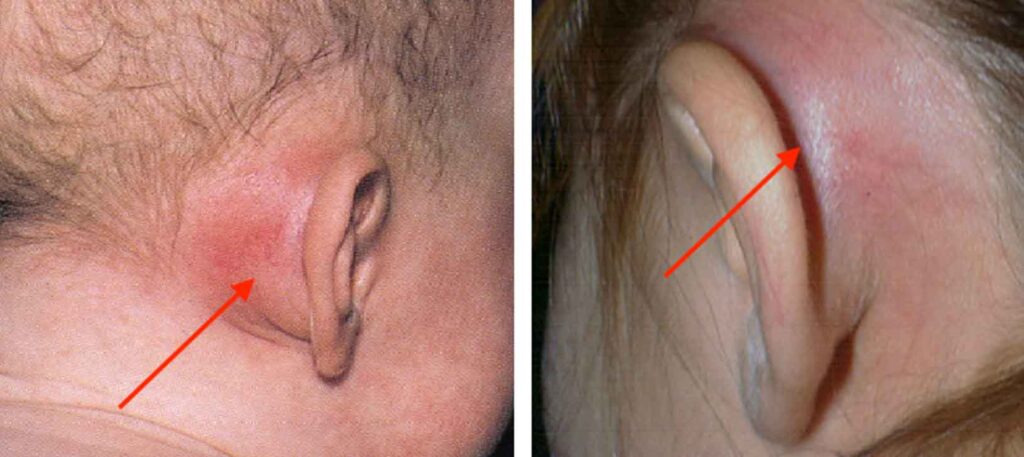Mastoiditis
Services > Mastoiditis
- Vertigo
- Ear Wax
- Ear Pain
- Ear Infections
- Ear Cholesteatoma
- Acoustic Neuroma
- Torn Ear Lobes
- Perforation In Ear
- Ototoxicity
- Otitis Media
- Mastoiditis
- Hearing loss
- Foreign bodies in the ear
- Rhinoplasty
- Breathing Problems
- Foreign bodies in nose
- Nasal Bone Fracture
- Nasal Septum
- Nasal Polyp
- Nasal Deformity
- Nosal Allergy Clinic
- Nose Bleeding Treatment
- Sinus Treatment
- Chronic Sinusitis
- Adenoidectomy
- Voice Disorders
- Salivary gland problems
- Papillary Thyroid Carcinoma
- Oral and Throat problems
- Laryngeal Vocal Nodules
- Laryngeal Vocal Cord Palsy
- Foreign body in esophagus
- Foreign body in bronchus
- Difficulty in Swallowing
- Cancer of the Larynx
- Sleep Apnea
- Snoring Treatment
- Head & Neck Cancer
- Thyroid Cancer / Papillary Carcinoma

Mastoiditis in Children and Adults
Mastoiditis (acute and chronic) is a bacterial infection of the mastoid cells in the mastoid bone, which is located just behind the ear.
Mastoiditis can become serious if the infection spreads outside the mastoid bone.
The mastoid bone is the back part of the temporal bone of the skull located just behind the inner ear. Mastoiditis is an infection of the mastoid bone. The mastoid bone is made up of a honeycomb-like structure, which is full of mastoid air cells. The mastoid air cells can become infected or inflamed, often as a result of an inner ear infection (otitis media). If the infection spreads outside the mastoid air cells into the mastoid bone (coalescent mastoiditis), serious health problems can arise.
Mastoiditis is more common in children, but it can affect adults as well.
Symptoms of acute mastoiditis and chronic mastoiditis include:
- Pain or discomfort in or behind the ear (otalgia)
- Redness or tenderness behind the ear
- Swelling of the area behind the ear (this may cause the ear to stick out)
- Ear discharge (otorrhea)
- Fever
- Headache
- Hearing loss in the affected ear
- Swelling behind the eyes
- Irritability
- Tiredness
- Dizziness or spinning sensation (vertigo) (uncommon)
- Weakened facial muscles (uncommon)
Is Mastoiditis life threatening?
If mastoiditis is treated promptly with antibiotics, it can often be cured. In some people, the infection comes back and another course of antibiotics is required.
If the infection spreads, serious and even life-threatening complications can occur such as:
- Hearing loss that may be permanent
- Facial nerve palsy (facial paralysis)
- Bone infection (osteomyelitis)
- Inflammation of the inner ear nerves (labyrinthitis)
- Blood clots, including sinus thrombosis, which is a blood clot in the sinuses that drains blood from the brain
- Brain abscess (epidural abscess or subperiosteal abscess) or other intracranial complications
- Meningitis
Can mastoiditis be prevented?
The best way to prevent mastoiditis is to prevent ear infections (otitis media) and treat any ear infection you have with antibiotic therapy.
Ways to prevent acute middle ear infections include:
- Wash hands frequently to prevent the spread of cold and flu viruses.
- Keep children away from secondhand smoke. Studies have shown children who are around smokers get more ear infections than children not exposed to smoke.
- Be sure your child gets the flu vaccine yearly. Vaccinated children get fewer ear infections than non-vaccinated children.
- Limit your child’s exposure to other children who have a cold or the flu.

